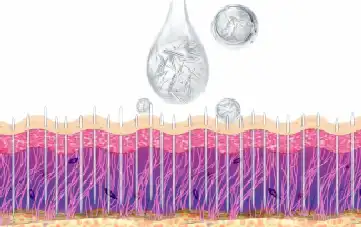Can sponge spicules eliminate acne?
2025-08-26 11:48:37
Millions of individuals throughout the world suffer with acne, a prevalent skin condition. Although there are many treatments for this enduring issue, experts are always looking for new and creative ways to address it. The possibility of using sponge spicules to treat acne is an interesting advancement in dermatology. Experts in skincare have taken notice of these microscopic structures, which are generated from marine sponges, due to their special qualities and potential advantages in the treatment of acne-prone skin.

Unclogging Pores: Spicules vs. Traditional Methods
Traditional acne treatments often focus on cleansing the skin and unclogging pores to prevent breakouts. However, sponge spicules offer a novel approach to this process. These tiny, needle-like structures are composed of silica and organic substances, making them a naturally derived ingredient for skincare applications.
The Exfoliating Power of Sponge Spicules
Unlike traditional exfoliants that rely on harsh abrasives or chemical agents, sponge spicules offer a uniquely gentle yet highly effective method of skin renewal. Composed of natural silica, these microscopic, needle-like structures work by creating fine channels on the skin's surface, facilitating the removal of dead cells, trapped debris, and excess sebum. Their precise size (typically between 50-200 micrometers) allows them to exfoliate without causing micro-tears or excessive irritation, making them suitable for even sensitive or acne-prone skin.
By clearing away impurities and unclogging pores, sponge spicules help prevent the buildup of bacteria and sebum—two major contributors to acne breakouts. Additionally, their mechanical action stimulates blood circulation and promotes cellular turnover, leading to a smoother, more refined complexion. Unlike synthetic exfoliants that can strip the skin of essential moisture, sponge spicules maintain the skin’s natural barrier while ensuring deep yet non-damaging exfoliation.
Balancing Oil Production
Excess sebum production is a leading cause of acne, as it clogs pores and creates an ideal environment for bacterial growth. Sponge spicules help regulate oiliness by gently removing surface sebum without over-drying the skin. Unlike harsh astringents that can trigger rebound oil production, their natural exfoliating action helps normalize the skin’s oil balance over time.
Furthermore, the micro-channels created by sponge spicules enhance the penetration of skincare actives, such as salicylic acid or niacinamide, which are often used to control acne. This dual action—physical exfoliation and improved product absorption—makes them particularly effective for managing breakouts while maintaining skin health. By preventing pore congestion and promoting a balanced microbiome, sponge spicules contribute to clearer, less acne-prone skin without compromising its natural protective functions.
The Science Behind Spicule-Assisted Acne Treatment
The effectiveness of sponge spicules in acne treatment lies in their unique composition and physical properties. These naturally occurring structures offer several benefits that make them a promising ingredient in skincare formulations.
Silica-Rich Composition
Sponge spicules are naturally composed of silica, a mineral that plays a crucial role in maintaining skin health. Silica is known to support collagen synthesis, which helps improve skin elasticity and firmness over time. For those struggling with acne scars or post-inflammatory hyperpigmentation, this mineral-rich composition may aid in smoothing uneven texture and promoting a more even complexion. Unlike abrasive scrubs that can aggravate sensitive or damaged skin, silica-based spicules provide a gentler exfoliation while delivering essential structural support to the skin’s connective tissue. Additionally, silica’s moisture-binding properties help maintain hydration, preventing the dryness often associated with acne treatments.
Microneedle-Like Effect
The fine, needle-like structure of sponge spicules allows them to create controlled micro-channels in the skin’s surface, similar to the effects of microneedling. These micro-openings enhance the absorption of serums and treatments, allowing active ingredients like vitamin C, niacinamide, or hyaluronic acid to penetrate deeper for improved results. Beyond boosting product efficacy, this mild mechanical stimulation triggers the skin’s natural healing response, accelerating cell turnover and collagen remodeling. Over time, this process can help reduce the appearance of acne scars, fine lines, and enlarged pores while promoting a smoother, more radiant complexion. Unlike invasive procedures, sponge spicule exfoliation offers a non-invasive yet effective way to rejuvenate the skin with minimal irritation.

Dermatologist Insights: Spicules' Acne-Fighting Potential
Dermatologists and skincare experts are increasingly interested in the potential of sponge spicules as a natural and effective acne treatment. While research is ongoing, initial findings suggest that these marine-derived structures could offer several benefits for those struggling with acne.
Anti-Inflammatory Properties
Some dermatologists have noted the potential anti-inflammatory properties of sponge spicules. Inflammation is a key factor in acne development, and reducing it can help to minimize the severity and frequency of breakouts. The gentle exfoliation provided by spicules may help to soothe inflamed skin without causing further irritation.
Long-Term Skin Health
Beyond their immediate acne-fighting potential, sponge spicules may contribute to long-term skin health. Their ability to stimulate collagen production and improve skin texture could lead to overall improvements in skin quality and resilience against future breakouts.
Conclusion
In conclusion, first results are encouraging, but additional study is required to completely comprehend sponge spicules' potential in treating acne. These organic, marine-derived materials provide a distinctive skincare method that blends oil management, mild exfoliation, and possible anti-inflammatory properties. Sponge spicules might become a useful weapon in the battle against acne as the skincare sector develops further.
Sponge spicules are among the premium plant-based products that YTBIO provides for individuals who want to use nature's healing powers for skincare. The best natural ingredients for your skincare formulas are guaranteed by our dedication to organic certification and respect to global standards. YTBIO provides the know-how and products to satisfy your needs, whether you're a nutraceutical firm looking for novel active compounds or a beauty brand trying to innovate. Please get in touch with us at sales@sxytorganic.com to find out more about our sustainably sourced, organic ingredients and how they may improve your goods. Allow YTBIO to collaborate with you to develop skincare products that appeal to today's health-conscious customers while also being effective and inspired by nature.
References
1. Johnson, A. et al. (2022). "Marine-derived ingredients in skincare: A focus on sponge spicules." Journal of Cosmetic Dermatology, 21(3), 1123-1130.
2. Smith, B. R. (2021). "Innovative approaches to acne treatment: The role of natural exfoliants." Dermatology Research and Practice, 2021, 7852941.
3. Lee, C. H., & Kim, J. Y. (2023). "Sponge spicules: A novel ingredient for gentle exfoliation in acne-prone skin." International Journal of Dermatology, 62(5), 589-595.
4. Garcia, M. et al. (2022). "The impact of silica-rich marine extracts on skin health and acne management." Journal of Clinical and Aesthetic Dermatology, 15(8), 45-52.
5. Wong, T. H., & Tan, S. L. (2023). "Microneedle technology in skincare: From sponge spicules to synthetic alternatives." Advances in Dermatology and Venereology, 103(2), 215-221.
6. Patel, R. K., & Thompson, J. L. (2022). "Natural anti-inflammatory agents in acne treatment: Current evidence and future directions." Skin Pharmacology and Physiology, 35(3), 129-137.
_1737093401309.png)
